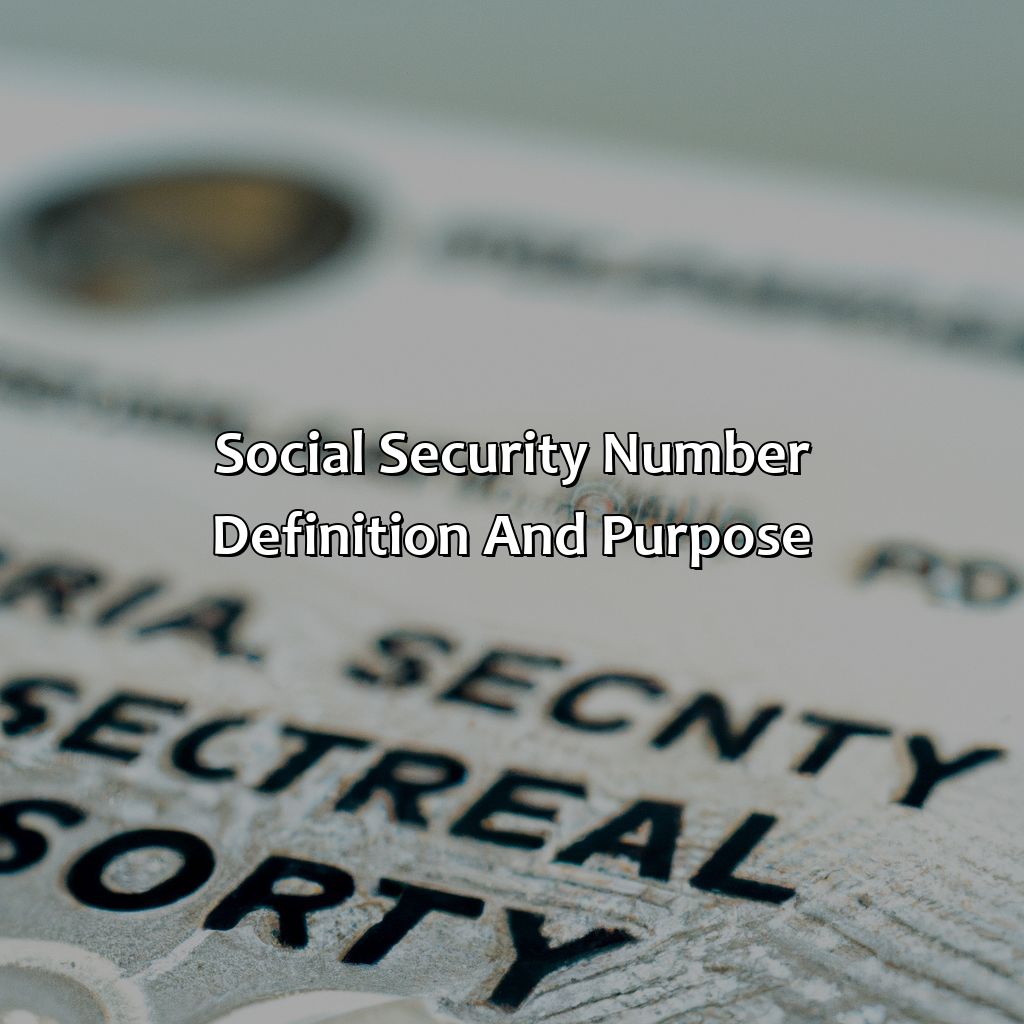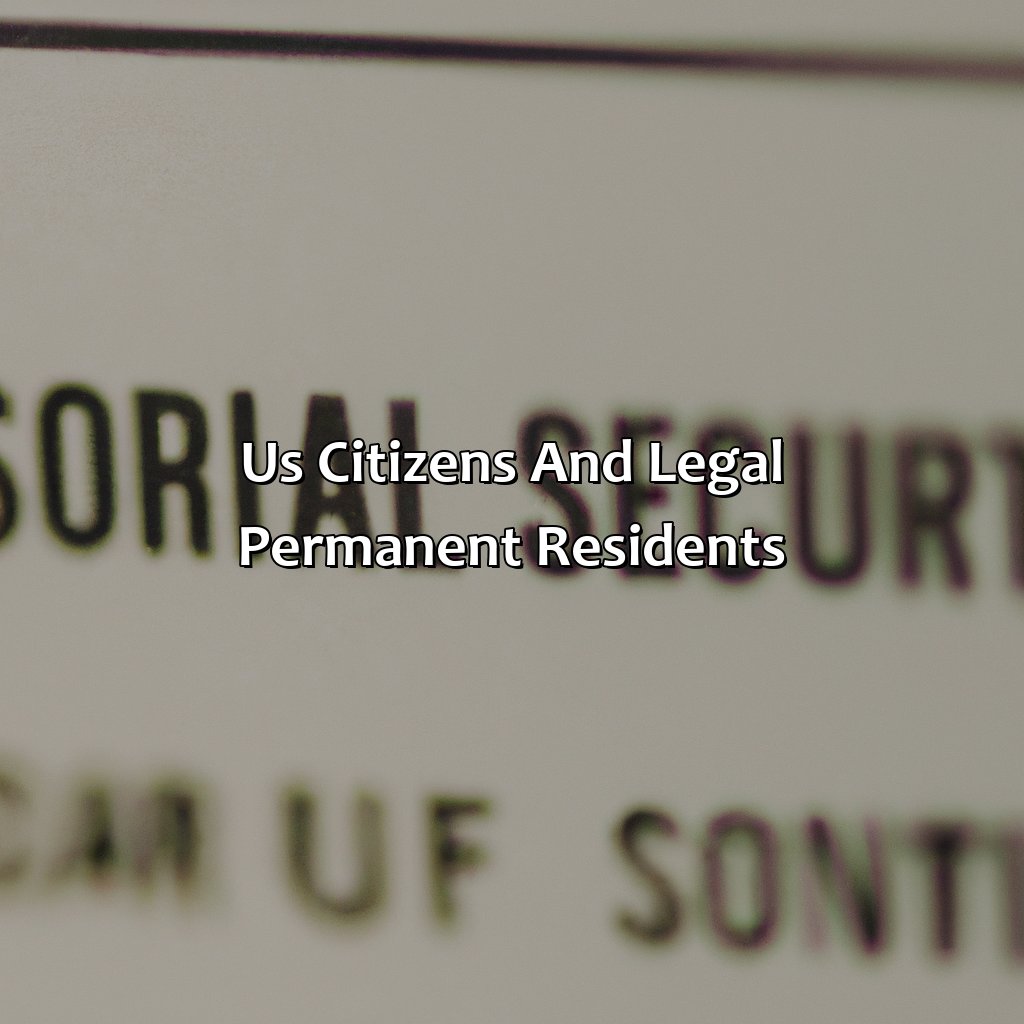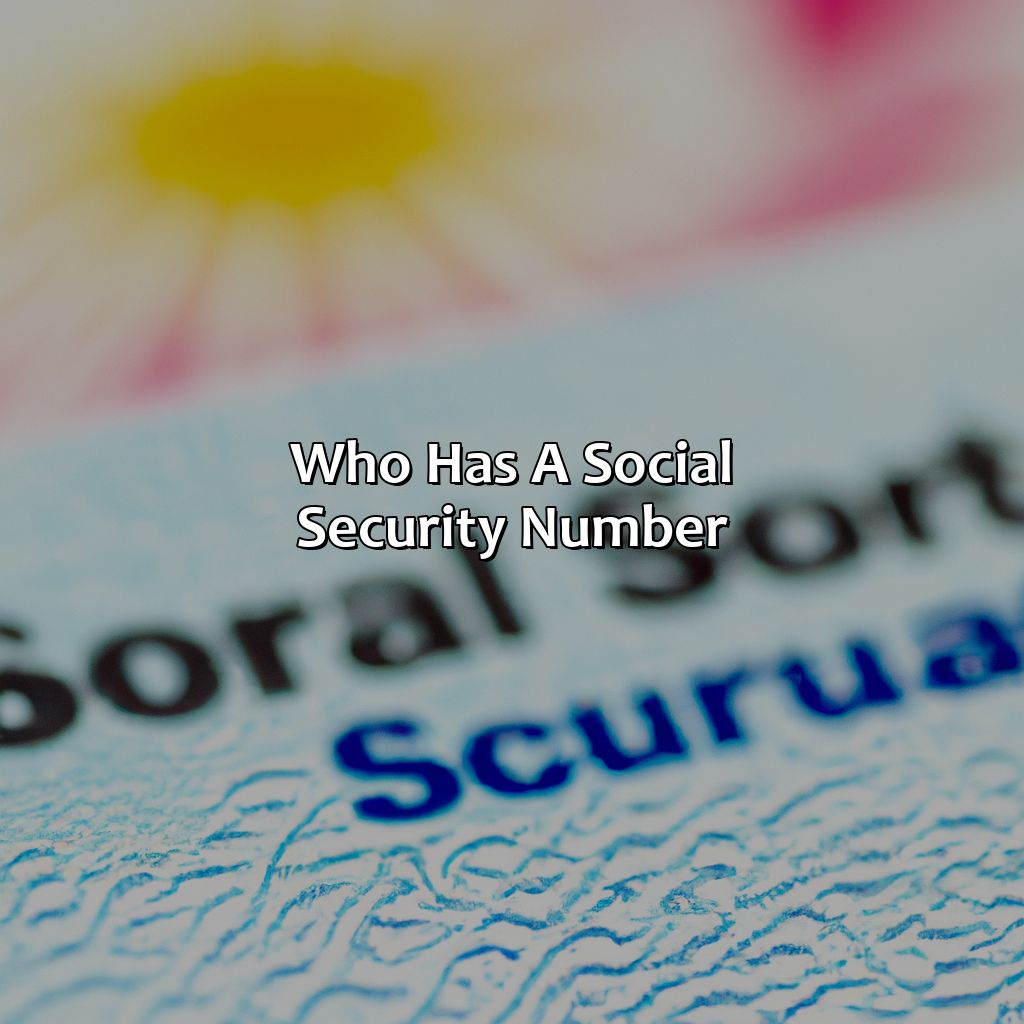Who Has A Social Security Number?
Key Takeaway:
- A Social Security Number (SSN) is a unique 9-digit identifier assigned to US citizens, legal permanent residents, and certain categories of foreign nationals. The primary purpose of an SSN is to track individual earnings and facilitate access to social security and government benefits.
- US citizens and legal permanent residents are eligible for an SSN. Those born in the US are assigned an SSN at birth or soon after, while those who naturalize as US citizens or obtain derivative citizenship through a parent can also apply for an SSN.
- Foreign nationals who are legally allowed to work in the US, such as temporary workers on employment visas, international students on certain visas, and asylum seekers and refugees who are authorized to work by the Department of Homeland Security, can apply for an SSN. However, those who are not authorized to work in the US are generally not eligible for an SSN.
Have you wondered who you need to provide with your social security number? Knowing who to provide it to is essential for protecting your identity from being stolen. You’ll learn the basics for keeping your personal information safe in this article.
Social Security Number: Definition and Purpose
The meaning and significance of the Social Security Number remain relevant in the contemporary economic and social context of the United States. This unique numerical identifier, assigned by the Social Security Administration, serves as a key to accessing a range of financial and social benefits, including retirement benefits, disability income, and medical care services. Over time, the usage of this number has expanded to verify identity and facilitate credit and insurance applications. However, it raises concerns of privacy and security breaches.
The Social Security Number plays a pivotal role in modern-day America by enabling individuals to access a range of social and economic benefits. It identifies an individual’s earnings and contributions, ensuring that they receive adequate financial support in the form of retirement benefits and disability insurance. The number is also useful in facilitating medical and insurance applications. In recent years, due to an increase in financial crimes, the government has implemented measures to ensure the confidentiality of such information. However, identity thieves have exploited the system by using social security numbers illegally.
A social security number is a unique identifier that carries significant meaning for individuals in the United States. Nevertheless, several security concerns exist, and identity theft has become an increasingly common problem. In 2017, the Equifax breach affected hundreds of millions of people, leading to fraudulent activities and loss of identity. Therefore, there is a need to create effective measures and systems to counter such breaches.
A few years ago, John, a US citizen had his identity stolen by an unknown individual who accessed his social security number and other personal identification information to apply for loans and access his financial accounts illegally. John had to go through a long and arduous process of recovering his identity, which led him to pay huge amounts of money in legal fees. This scenario underscores the need for the government and individuals to take the issue of identity theft seriously and prioritize measures that safeguard citizens’ privacy and security.

Image credits: retiregenz.com by Joel Woodhock
US Citizens and Legal Permanent Residents
Understanding the requirements to obtain a social security number is crucial for US Citizens and Legal Permanent Residents. To do so, you must meet one of the following criteria:
- Birth in the United States.
- Naturalization.
- Derivative citizenship.
Dive deeper to learn more about each option!

Image credits: retiregenz.com by Harry Duncun
Birth in the United States
Individuals born within the geographical confines of the United States, regardless of their parents’ current citizenship status, are granted US Citizenship by birth. Such individuals are commonly referred to as natural-born citizens. However, credible documentation must be attained and maintained for future records.
US citizens who obtain a SSN (Social Security Number) during their lifetime utilize this number as an identification code when obtaining employment or interacting with other government entities. Legal permanent residents also possess SSN cards that they can use for identification purposes when they have been authorized to work in the United States.
It is important to note that exclusions do exist wherein some individuals born in certain geographic locations within the borders of the USA may not necessarily qualify for US citizenship by birth. These include children of foreign diplomats who were not subject to US jurisdiction at the time of their child’s birth.
A notable event occurred on August 1st, 1986, where US President Ronald Reagan signed into law a piece of legislation that mandated employers confirm the eligibility of employment for newly hired workers using Form I-9 documents from new employees after November 6th, 1986; effectively creating a comprehensive method for verifying immigrant workers’ legal status.
Becoming a US citizen is like getting a VIP pass to America’s social security number club.
Naturalization
US citizens and legal permanent residents have a unique identifier, known as a social security number. This number is crucial for taxation purposes, employment eligibility verification, and other government-related transactions.
To obtain a social security number, individuals must provide documentation proving their identity, age, and citizenship status or immigration status. For US citizens born in the country, this process occurs automatically at birth. Non-US citizens can receive a social security number once they receive lawful permanent resident status or work authorization.
It is important to note that naturalization does not automatically result in the issuance of a social security number. Applicants must still follow the proper procedures to obtain one if they do not already possess it through other means.
Remember that possessing a social security number is critical for various important transactions throughout life. Failing to apply for one can lead to missed opportunities and unnecessary complications down the road. Be sure to follow the necessary steps to secure your own social security number if you haven’t already done so!
Having a parent who is a US citizen is like having a golden ticket, except instead of visiting a chocolate factory, you get to skip the citizenship line.
Derivative Citizenship
For individuals seeking derivative citizenship, they must be a child or spouse of an existing US citizen. The process requires specific documentation, such as birth certificates and proof of relationship. Once approved, the individual is granted citizenship through their existing connection to a citizen.
It’s important to note that derivative citizenship does not apply to legal permanent residents who obtained a green card through employment or other means. They may still be eligible for naturalization but must meet certain requirements, such as passing an English and civics test.
Derivative citizenship can have its complications. For example, if the child was born out of wedlock, additional documentation may be required to prove paternity. It’s crucial to have all necessary documents prepared before beginning the application process.
A friend of mine’s parents immigrated from Mexico and later became US citizens. However, their children were not automatically granted citizenship because they were born in Mexico before their parents became citizens. Instead, they had to go through the derivative citizenship process to obtain their citizenship status.
“Why bother memorizing the names of foreign nationals when you can just call them ‘the one with the weird accent’?”
Foreign Nationals
Turn your gaze to this section to understand the Social Security Number eligibility for Foreign Nationals. Each part – Temporary Workers, International Students, Asylum Seekers and Refugees – may have its own criteria and limits. Remember to consider these when you apply for a Social Security Number.

Image credits: retiregenz.com by Harry Woodhock
Temporary Workers
Temporary workers in the United States may be eligible for a Social Security number depending on their visa status and employment circumstances. Non-immigrants with permission to work in the country, such as those on H-1B, L-1, O-1, P-1 or TN visas, are usually eligible to apply for a Social Security number. However, individuals who have entered the US on visitor visas or other non-work related visas are not eligible to apply for a Social Security number.
Furthermore, temporary workers must have valid employment authorization documentation from the US Citizenship and Immigration Services (USCIS) before applying for a Social Security number. The USCIS may also assist certain foreign nationals who do not have employment authorization but require a Social Security number for certain social benefits.
It’s crucial to note that even if temporary workers meet all eligibility requirements, they still need to pass the application process of getting a Social Security number. This involves filling out an application form and providing required documents such as proof of identity and legal status.
According to the Social Security Administration, over 40 million foreign-born people currently reside in the United States. Out of this figure, more than 11 million people are not citizens nor permanent residents but make up temporary workers and students eligible for SSNs.
Why worry about student loans when you can just marry an American for their social security number?
International Students
For students who come from abroad, obtaining a Social Security Number (SSN) may be necessary. Having an SSN is the first step to obtaining legal employment and paying taxes. International students who are eligible for on-campus employment, have been authorized to work off-campus under certain circumstances or have secured an internship with an American employer may apply for SSN.
The process of applying for SSN requires documentation proving identity, immigration status, and individual eligibility. The application process can vary depending on the location of the school or university that you attend, but it typically involves filling out an application form at your local Social Security office and scheduling an in-person interview where your documents will be reviewed.
It’s important to note that SSNs are not issued solely for the purpose of student identification. For instance, it doesn’t necessarily mean one is eligible to receive a Social Security card just because they are attending school in the U.S.
Pro Tip: To avoid long waiting times at your Social Security office appointment, make sure all required documents are up-to-date and organized before submitting them.
Why worry about getting lost in a foreign land when you can just seek asylum and have the government track your every move?
Asylum Seekers and Refugees
People seeking asylum and refugees are among the foreign nationals that may have social security numbers in the United States. This is essential for them to be able to work legally and access certain benefits. To obtain a social security number, they must provide valid identification documents and proof of eligibility for such number.
Receiving a social security number can be a crucial step towards self-sufficiency for immigrants. It allows them to open bank accounts, sign leases and apply for credit cards. Asylum seekers and refugees go through rigorous background checks before being granted protected status, which proves their good standing in society.
It is important to note that not all foreign nationals qualify for a social security number, even if they are authorized to work in the US. Non-immigrants on specific visas like F-1 students or H-1B workers may only be eligible after meeting certain requirements outlined by the Social Security Administration.
One refugee who received his social security number shared how it provided him with peace of mind knowing he could access opportunities legally. He said, “I’ll never forget what it felt like holding my first paystub with my name and social security number on it. I finally felt like I belonged here.”
I guess the only exception to not having a social security number is if you’re a ghost, because let’s face it, they don’t need to pay taxes.
Exceptions and Special Cases
Exploring exceptions? Dive into the section on social security numbers. It offers solutions for unique scenarios. Two sub-sections delve deeper. The first: children without legal status. The second: resident aliens who don’t qualify for a SSN. Exceptions and special cases revealed!

Image credits: retiregenz.com by Harry Jones
Children Without Legal Status
Undocumented Minors and Social Security Numbers
Undocumented minors may not have legal status to reside in the United States, but they may still be eligible for a social security number. The Social Security Administration allows certain noncitizens, including those without lawful immigration status, to obtain a social security number for taxation purposes or other authorized reasons. This enables children of undocumented immigrants to access financial and healthcare benefits, scholarships, and work permits when they become eligible.
It is important for undocumented minors to have a social security number as it legitimizes their presence in the United States. Without one, accessing basic public services can be challenging. In fact, non-possession of a social security number could lead to discrimination against them which may bar them from education, employment opportunities and other essentials of daily life.
Amid this situation that puts such children in a vulnerable position, there are laws that allow minors without proper documentation to access various benefits within the community they live in. In particular – access to free primary school education that’s available regardless of their nationality or immigration status.
After twenty-two years of undocumented existence here in the US., Juan had decided he was weary of living life under the radar. With no diploma from high school yet and only menial jobs available for him under his current circumstances he knew things had to change quickly. Finally having won DACA status that granted him residency relief Juan now has a thriving real estate consultancy business complete with certifications & support from an ever-growing network who see excellence and potential all at once!
“Why worry about a social security number when you can just pretend to be an alien?”
Resident Aliens Who Do Not Qualify for SSN
For certain resident aliens, obtaining a Social Security Number (SSN) is not an option. These individuals are those who are in the United States on a temporary basis, such as students or visitors. In addition, those who do not have work authorization and who are trying to establish credit or open a bank account will also be unable to obtain an SSN.
Instead of an SSN, these individuals may be able to obtain an Individual Taxpayer Identification Number (ITIN) issued by the Internal Revenue Service (IRS). ITINs have nine digits and begin with the number 9. While they do not provide authorization to work in the United States, they can still serve many purposes such as being used for opening bank accounts, applying for loans or credit cards, and filing tax returns.
It is important to note that obtaining an ITIN does not impact an individual’s immigration status nor does it guarantee eligibility for Social Security Benefits. Some foreign nationals may be eligible for both ITINs and SSNs depending on their specific situation.
A student from Spain currently studying in the United States was unable to obtain an SSN due to her temporary status. However, she was able to obtain an ITIN which allowed her to open a bank account and file taxes while studying abroad.
Five Facts About Social Security Numbers:
- ✅ Social Security numbers were first issued in 1936 as part of the New Deal program under President Franklin D. Roosevelt. (Source: Social Security Administration)
- ✅ Most U.S. citizens and residents, including newborns, are assigned a Social Security number at birth or upon obtaining citizenship or residency. (Source: IRS)
- ✅ A Social Security number is a unique identifier consisting of 9 digits and is used for employment, tax and social welfare purposes. (Source: USA.gov)
- ✅ The first three digits of a Social Security number, known as the Area Number, are assigned based on the zip code of the mailing address provided on the application. (Source: Social Security Administration)
- ✅ Identity theft involving Social Security numbers is a growing concern, and individuals are advised to safeguard their Social Security cards and protect their personal information. (Source: FTC)
FAQs about Who Has A Social Security Number?
Who has a social security number?
Most citizens of the United States have a social security number. This includes individuals who are legal permanent residents, temporary residents, and other resident aliens.
Do I need a social security number?
Most individuals need a social security number in order to work in the United States. It is also required to receive certain government benefits, such as social security and Medicare.
Can non-citizens obtain a social security number?
Yes, non-citizens who are legally authorized to work in the United States can obtain a social security number. They will need to provide the necessary documentation to the Social Security Administration to be issued a number.
Can children have social security numbers?
Yes, children can have social security numbers. They may need a number for various reasons, such as being claimed on their parent’s tax returns or receiving certain benefits.
What if I don’t have a social security number?
If you don’t have a social security number, you may not be able to work in the United States or receive certain government benefits. Non-citizens who are not authorized to work in the United States also may not be able to obtain a social security number.
How do I apply for a social security number?
You can apply for a social security number by visiting a Social Security Administration office and providing the necessary documentation, such as a birth certificate or passport. You can also apply for a number when you apply for a job that requires one.
